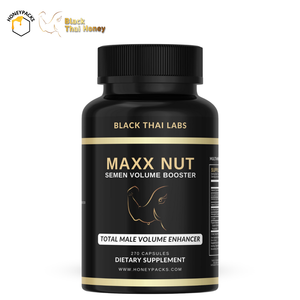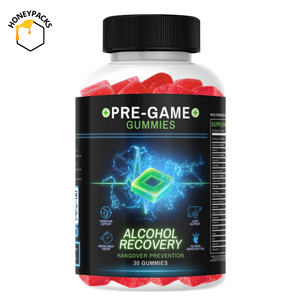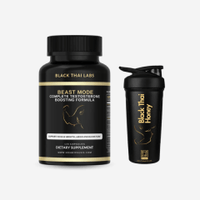Vitamin D3 Mood Benefits | Focus, Sleep, and Clarity
Vitamin D3 supports mood by boosting serotonin, reducing stress hormones, and improving brain function. Low levels are linked to anxiety, poor sleep, and brain fog. When stacked with ingredients like magnesium and K2, D3 helps you feel calmer, sharper, and more in control.
It is one of the most overlooked mood tools men can use. It sharpens focus, smooths out mood swings, and helps you stay level even when life hits hard.
Vitamin D3, scientifically known as cholecalciferol. It’s a hormone that your body makes when your skin is exposed to sunlight. You can also get it from foods like fatty fish or fortified milk, and of course, through supplements.
Inside your brain, Vitamin D3 binds to receptors in key mood-regulating areas like the hippocampus, prefrontal cortex, and limbic system. These aren’t just any regions, they’re the command centers for emotion, motivation, and mental clarity.
Can Vitamin D3 Actually Improve Your Mood?
Research links low D3 levels with higher rates of depression, anxiety, and mood swings. Your brain depends on D3 to help regulate neurotransmitters like serotonin and dopamine.
These are the chemicals that influence how calm, focused, and motivated you feel. When D3 is low, those chemicals don’t fire the way they should, and it shows up in how you feel day to day.
Clinical studies back this up. People with low D3 who supplement consistently tend to see measurable mood improvements.
D3 gives your brain what it needs to fire on all cylinders. And when you support the right systems, your mood doesn’t just survive, it starts to level up.
How Long Does It Take for Vitamin D3 to Improve Mood?
Most studies say it takes 2 to 4 weeks for noticeable changes. That’s how long it usually takes for your body to adjust and shift hormone levels.
Some people tell us they feel lighter within a few days, more focused, better sleep, and a little more patience. That early lift might come from correcting a severe deficiency, or it might be your brain reacting fast.
Why Does Vitamin D3 Make Me Feel Better?
Vitamin D3 helps reduce inflammation and oxidative stress in your brain. That alone can improve how you feel day to day. Less stress on your system means less fog, less irritability, and more control over your mood.
It also helps regulate your HPA axis. That’s the system responsible for managing cortisol, the stress hormone that wrecks your focus, sleep, and mood when it spikes.
When D3 is dialed in, your body handles stress better. You’re not running on fumes or chasing highs and lows.
D3 supports the production of BDNF, a type of brain-derived growth factor that keeps your mind resilient. It helps your brain adapt, stay clear-headed, and bounce back when life hits hard.
It also plays a role in converting tryptophan into serotonin, the mood-regulating chemical most guys only hear about in antidepressant ads.
Does Vitamin D3 Increase Serotonin?
Your body makes serotonin from tryptophan. But it needs an enzyme, tryptophan hydroxylase 2, to convert it in your brain. Vitamin D3 helps flip that switch. Without enough D3, your system struggles to make that serotonin, and that shows up fast in your mood, sleep, and focus.
Some antidepressants (SSRIs) work by blocking the reabsorption of serotonin. D3 doesn’t block; it helps your body make more of the good stuff in the first place.
Low serotonin hits hard, racing thoughts, restless sleep, that flat feeling in your chest. If that sounds familiar, don’t just mask it. Get to the root.
Can Vitamin D3 Help with Anxiety and Depression?
Vitamin D3 might be playing a bigger role than you think. Low levels of D3 show up consistently in men battling anxiety and depression.
When D3 drops below 50 nmol/L, that's when the wheels start falling off. You feel slower, your fuse is shorter, and your motivation disappears. That’s because D3 helps manage cortisol, the stress hormone that wrecks your mood when it stays high.
It also supports brain health by easing inflammation, which is a hidden trigger for anxiety and emotional fatigue.
Long-Term Vitamin D3 Use: Is It Safe?
Most guys do fine with 2,000 to 4,000 IU per day. That’s what most health professionals suggest. Some take more, 10,000 IU or higher, but that’s something you do with blood work and a plan.
Aim to keep your levels between 30 and 70 ng/mL if you're trying to support your mood and stay sharp.
Some of them take high doses without balancing. That’s when you can run into problems like anxiety, fatigue, or even calcium buildup.
Vitamin D3 works best when it’s stacked with the right support, like K2 and magnesium.
Why Honey Packs Is Built for Mood Support
If you're a man trying to stay sharp under stress, show up fully in your work and relationships, and feel like yourself again, Vitamin D3 might be the missing piece.
Low D3 hits harder than people think. You feel tired, unfocused, maybe even irritable for no clear reason.
That’s why we built Honey Packs, to support men who want to feel level-headed, energized, and locked in without relying on fake boosters or synthetic junk.
Here’s what you get when you stack the right blend of D3 with other mood-supporting ingredients:
👉 Beast Mode by Black Thai Labs - Formulated for performance and clarity, this stack fuels testosterone support and mood balance, perfect for men who want to lead with confidence every day.
👉 Maxx Nut - Ideal for staying sharp during stressful stretches. Combines D3 with herbal adaptogens to help you stay mentally clear while boosting stamina.
Ready to Feel the Difference?
Before you start loading up on Vitamin D3, get your levels checked. It’s the fastest way to know if low D is behind your mood swings, brain fog, or sleep issues.
If you’re serious about mood, energy, and staying sharp, don’t take D3 alone. That’s why we built Honey Packs the way we did. You get D3 with magnesium, K2, ginseng, and black ginger in one stack.
Each ingredient supports the others, so your body absorbs what it needs without the side effects that come from throwing random pills into your routine. Grab a pack, stick to the routine, and let the formula do what it’s built to do.







